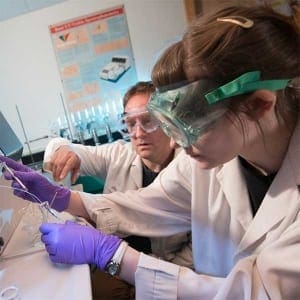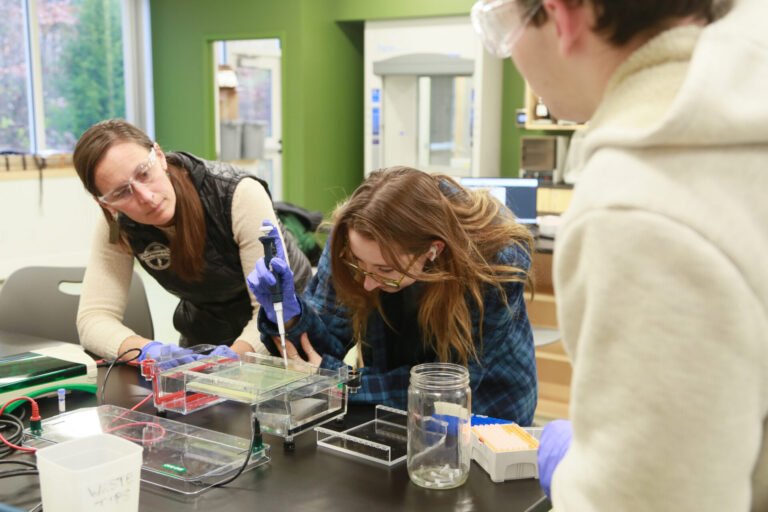
Assistant Professor in Computers and Geographic Information Systems Dr. Kathleen Dunckel presented her latest research findings in November at the international ForestSAT conference in Riva del Garda, Italy, focusing on the applications of forest geomatics. The title of the talk was “Predicting the spatial distribution of Tsuga canadensis in Maine using remote sensing and GIS.” These results are summarized in a manuscript being reviewed for publication. Dunckel also continues to work on the Hemlock Ecosystem Management Study with colleagues Professor of Ecology Dr. Amy Arnett, Associate Professor of Botany Dr. Erika Latty and Assistant Professor of Wildlife Biology Dr. Brent Bibles.
Dr. Emma Perry received $1,000 seed money as part of The Unity College Undergraduate Research Mentor Award for her 2015 project titled “Tardigrades of Acadia National Park.” Dr. Perry and two student collaborators are investigating terrestrial and marine tardigrades — tiny invertebrate organisms measuring .039 of an inch on average — throughout the park. Despite their size, tardigrades are found all across the globe and can thrive in some of the most hostile conditions on earth, from the deepest Maine lakes to the vacuum of outer space.
Perry, Assistant Professor of Cell Biology Dr. Ellen Batchelder and two student interns also continued a groundbreaking study to determine the distribution and ecology of a new species of tardigrade — E. wyethi – which apparently exists only on Allen Island, Maine. The new species is distinct from all other Echiniscoides by the smooth cuticle, long flexible buccal tube, and the number of claws on the legs of the adult. The formal description of E. wyethi and other research findings were published in the peer-reviewed Proceedings of the Biological Society of Washington this year.
Arnett co-authored two publications in review: “Examining the relationship between student understanding of and belief in climate change,” for the European Journal of Education Research; and “Preference of antlion and wormlion larvae for substrates according to substrate particle sizes,” for the European Journal of Entomology.
Under Arnett’s direction, sustainability science research by faculty in the Center for Biodiversity appeared in an impressive array of publications. Perry co-authored “Looking at Tardigrades in a new light: using epifluorescence to interpret structure,” in the Journal of Microscopy; Assistant Professor of Conservation Biology Dr. Matthew Chatfield co-authored three treatises appearing in Herpetological Review; Batchelder co-authored “Extending the molecular clutch beyond actin-based cell motility” in New J Phys.; Associate Professor of Mathematics Dr. Carrie Diaz Eaton co-authored “Modeling Effectiveness of Tick Control by a Species that Exhibits Predator-prey Role Reversal” in the Final Proceedings of the Modeling, Simulation & Visualization 2014 Student Capstone Conference; and Assistant Professor of Sustainable Fisheries Management Dr. Pamela MacRae co-wrote “Trophic ecology of turtles and prevalence of omnivory in a north Florida lake food web,” in review for Copeia.
In March, Latty gave presentations on campus with important ramifications for Maine land use and conservation: “Earthworms and their Ecological Impact” was delivered before the annual meeting of the Maine Associations of Professional Soils Scientists on March 4, while her “Forest Response to Stress: The Effects of Invasive Species and Land Use” was given during a Fishbowl presentation on March 31.
As part of a $2.9 million, multi-institutional collaborative grant with College of William & Mary, the University of Pittsburgh, and the University of Wisconsin, Eaton was awarded $935,551 as co-Principal Investigator in “IUSE Collaborative Grant: QUBES: Quantitative Undergraduate Biology Education and Synthesis,” from the National Science Foundation’s Ideas Lab project.
“Supercluster Arion and Other Phenomena,” a show of photographs by adjunct art professor Deanna Witman, was exhibited in The Leonard R. Craig Gallery in March and April. Exploring elements of time and biology as process and as universal connections, Witman worked with common slugs on silver photographic paper over three years of nightly slug hunting trips in the woods followed by late-night darkroom sessions. Witman also received two grants for a photographic project dealing with climate change: one from The John Anson Kittredge Education Fund and from The Kindling Fund via SPACE Gallery. Witman is also exhibiting in two solo exhibitions as part of the Maine Photo Project .
In a February Fishbowl talk, a Professor of Human Ecology Dr. Mick Womersley addressed interactions between climate policy and geopolitics, in his talk “Applying Realism to Climate Policy.” Womersley also was featured in a six-minute Maine Public Broadcasting Network feature on Unity titled “Students at Maine’s Unity College Walk the Sustainability Talk.”
Dr. Aimee Phillippi, associate professor of biology and Unity College Honors Program co-director, spoke in March about the effects of commercial rockweed removal. In her recently published study, Phillippi – who holds a PhD in marine biology from the University of Maine — examined the impact of rockweed removal on invertebrates living beneath the rockweed canopy.
Barry Woods spoke at the New England Mathematics Association 2015 Conference entitled “STEM Rests on Math,” held at Quinsigamond Community College in Worcester, MA in March. His presentation on Using Excel to Calculate Ecological Statistics – specifically, the Z-test for 1-proportion, the chi-square goodness of fit test, the Z-test for the Holgate statistic, and a 2-sample t-test used to compare Shannon-Wiener diversity indices was a result of his Unity College Faculty Grant for Scholarship. In June, Barry will once again be scoring the AP Statistics exams in Kansas City, MO.
A celebration was held in April to laud Unity College Professor of Humanities Dr. Diane Murphy, who published The Bitter Age, a book-length translation of observations based on 14th-century science some of which were once considered heretical. Murphy’s translation of the Acerba by Cecco d’Ascoli was published by Capponi Editore, an Italian publisher. Murphy promoted the book at multiple appearances in Italy, and her book signing took place in Ascoli Piceno, Italy, in March.
As some circuses decide to no longer use elephants and Sea World announced it would double the size of its whale pens, Dr. Sarah Cunningham, director of the Center for Experiential and Environmental Education, told the Christian Science Monitor and KCED-FM radio in California a deep-seated shift is under way in public attitudes toward animals. “Part of the reason … is because we’ve learned so much about the cognitive abilities and social lives of other species from individuals that we work with and study in captivity,” Cunningham said.
In May, Dr. Melik Peter Khoury was named executive vice president and chief academic officer for Unity College as it continues to reinforce its national focus as America’s Environmental College. The appointment by college President Dr. Stephen Mulkey gives Khoury academic and operational responsibility for the college, which Mulkey said “is at a crucial point in the realization of our strategic initiatives.” Khoury has served in a number of senior management roles in educational institutions undergoing change, including Upper Iowa University, Culver Stockton College, Paul Smith’s College and several University of Maine postings.
Assistant Professor of Environmental Communications Dr. James T. Spartz co-authored an article investigating how language – or narrative framing – can affect perceptions of land-use change related to using croplands or woodlands bioenergy purposes. “Public perceptions of bioenergy and land use change: Comparing narrative frames of agriculture and forestry” was published in Biomass & Bioenergy. Spartz also co-authored a tourism study offering new research into the factors that attract tourists and motivate them to return. “Promoting Economic Development with Tourism in Rural Communities: Destination Image and Motivation to Return or Recommend” was published in the current issue of The Journal of Extension.
Professor of Art Ben Potter announced he is now represented by KPK Contemporary Art, a gallery based in London and Geneva. He also recently installed a sculpture installation at Coleman Burke Gallery in Portland, Maine. View his KPK exhibitions at http://www.kpkgallery.com/ and view his larger body of work at www.benpotterstudio.com.
Assistant Professor of Sustainable Agricultural Enterprise Dr. Mary Saunders Bulan started a partnership with a Portland nonprofit organization to supply seedlings for a Community Supported Agriculture project. The seedlings will be planted on a diversified vegetable farm serving CSA, wholesale, and direct markets in Lisbon, Maine. Saunders Bulan also was the lead author of two peer-reviewed articles from her dissertation research: “Buckwheat Species as Summer Cover Crops for Weed Suppression in No-Tillage Vegetable Cropping Systems,” which will appear in Weed Science in 2015; and “Social, economic, and environmental influences on tartary buckwheat varietal diversity in Yunnan, China,” in review for Genetic Resources and Crop Evolution.
A short story collection by Assistant Professor of Conservation Law and Environmental Policy Zach Falcon will be published by the University of Alaska Press in October as part of its Alaska Literary Series. The stories of “Cabin Clearing Forest” are set in coastal Alaska, where Falcon was born and raised.
Parks and Forest Resources Associate Professor Tom Mullin was invited to present workshops at the 2015 Maine Land Trust Conference, 2015 Maine Governors Conference on Volunteerism and Community Engagement, the 2015 National Association for Interpretation’s Annual Conference in Denver Colo., the 2015 International Trails Symposium, and the 2015 Association for Partners in Public Lands Conference in Atlanta, Ga. He was also recently elected to top posts as officer for the National Association for Interpretation and on the board of directors for the Maine Woods Forever Roundtable.
Adjunct Instructor Michele Leavitt gave readings of her creative work in Concord, N.H., Newburyport, Mass., and Portland, Maine, and at the West Chester Poetry Conference in Pennsylvania. Several of her poems have been accepted for publication in the summer, 2015 issue of Mezzo Cammin. She continues to serve as president of the board of directors for the Maine Film Center.
Associate Professor of Sustainable Enterprise Dr. Janis Balda was awarded a Unity Faculty Grant for Scholarship for a project titled Business Best Practices to examine and apply a model of sustainability and profitability in food service enterprises, exploring a community based model in Zingerman’s Community of Businesses in Ann Arbor, Mich. Balda also received a third-year grant from the C. Charles Jackson Foundation to continue work on attempts to measure Generation Y recent graduates in the workplace who participated in academic leadership development programs as Undergraduates.
Director of Career Services Nicole Collins and Mullin presented “Creating a Sustainable Internship Program” outreach programs for The Association of Partners for Public Lands Conference in Atlanta, Ga., in February and for the International Trails Symposium in Portland, Ore., in May. Topics included creating meaningful experiences for students, engaging with colleges and universities and the nuts and bolts of quality internship programs.
Professor Doug Fox, director of the Center for Sustainability and Global Change, presented Measuring Agricultural Sustainability at a National Association of Agriculture Educators conference in New Haven, Conn. Fox detailed Garden in a Box: A Food Security Study, a project developed by two seniors who won $1,000 from the Camden Conference. Thirty Garden in a Box starter-garden kits were put together and distributed to food insecure families in Waldo County this spring. Next fall, students will follow up with those families with a survey to document the degree of follow-through. A study of nutritional output from the starter gardens is planned for coming years.



